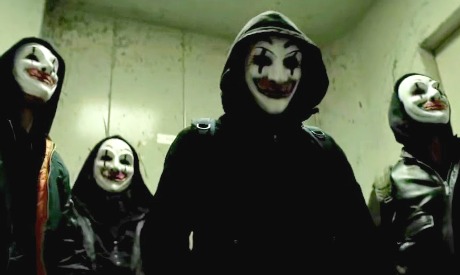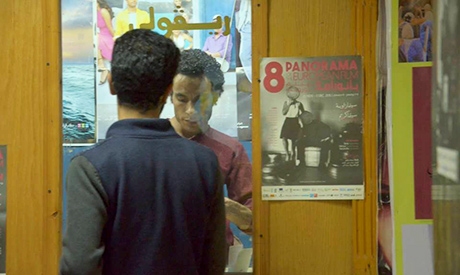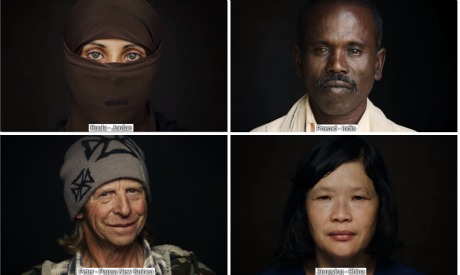In its eighth edition in 2015, the Panorama of European Film managed year to involve the Egyptian audience with interesting selections of European cinema and art.
Stretching out with more than 50 features, shorts and documentaries, the heavily packed session offered an underground quintessential festival experience to cinephiles.
Below are some of many angles that made this year’s Panorama special.
Refugee or human? A focus on displaced individuals
This year’s film selection did not shy away from capturing the lives of people caught living, moving and settling on those lines we call boarders. Tawfiq Sameh, a Syrian refugee who lives in Greater Cairo’s 6 October City, came to Cinema Karim to watch Hisham Zaman’s Letter to the King. He told Ahram Online that the film showed that refugees are human beings before they are displaced people.
“I liked the film. It showed that ‘refugees’ do not necessarily leave their countries due to a crisis, such a war, a flood or oppression. The film shows that refugees are normal people who seek love, money, revenge, sex and stability. They also can be selfish, material, kind or abusive. They are humans after all,” Sameh told Ahram Online.
Similar to Zaman’s moving and low budget Letter to the King, which received the Best Screenplay Award in the feature film at the 26th Carthage Film Festival, other documentaries and features narrated stories of humans both stuck and willing to cross what Sameh described as “politically drawn lines on a piece of paper.”
Along the same lines was Moroccan-Iraqi filmmaker Tala Hadid’s 2014 debut, The Narrow Frame of Midnight, which visually tells a story of characters who were set to live in/pass by a troubled Middle East, arguably all victims, whether they are opportunist child traffickers, a tortured militant, a hopeful brother and writer, or an orphaned young girl who might or might not represents hope.
While the last two films showed a variety of characters, the Queen of Silence showed the harsh reality surrounding the much marginalised gypsy community, focusing on a 10-year-old girl with a severe hearing impairment living in a Polish gypsy settlement, threatened with evacuation.
Directed by Agnieszka Zwiefka, the hybrid documentary humanises Denisa, who is an outcast from the so called “international community” but is also an alienated among her gypsy family and friends, by highlighting her love of Bollywood music, choreographing fantastic dancing.

(Photo: Still from Who Am I)
An underground sightseeing of Europe
Among the many films that illustrated how European artists view their continent objectively and subjectively, several of this year’s films showed what could be argued is an unheard and critical scope of Europe.
Victoria, a single-shot 140-minute flipped out thriller, follows a Spanish musician who gets involved with a local naive gang in the cold and dark streets of Berlin. The racy is plot filled with drinking, dancing, action in underground nightclubs, and somehow romance, as well as the impressive cinematography, resulting in a cutting and neat choice for a festival-goer.
Close to the same genre was Who Am I?, a hacking action thriller by Swiss director Baran bo Odar and a film which argues that really “no system is safe” by following a misfit and anti-capitalist hacker in the world of virtual technology.
Also showing a side of Europe that is not often discussed was Letter to the King, where the all happy, white and prosperous narrative of Norway is questioned by showing the stories of five refugees who are to spend one day in Oslo, asserting that amid argued happiness exits agony and pain.
With a more political and economic scope, viewers of the Panorama encountered ‘A journey through Greece in a time of crisis,’ which provides a different analysis of the country’s economic crisis with humour, satire, drama and struggle.
Mohamed Said, a middle aged teacher who watched Who Am I? and Letter to the King in Cinema Karim, told Ahram Online that the two films “offer a different image than what we Egyptians are used to when encountering art that has to do with European countries.”
He added that “in the 1990s, there used to be a TV show that aired on Egyptian TV called French Panorama, which was very popular and watched by the young and older audience alike. It picked popular culture from Europe and France that fascinated Egyptians. Who Am I?, for example, tells us that the very tightly secured technology systems are venerable.”

Cinema Rivoli in Tanta
A tribute, a documentary and a retrospective
For cinephiles, this year’s panorama did not only give room to appreciate works from the last two years of European art, but also gave a hall of fame tribute to much respected filmmakers such as the complicated and majestic Manoel de Oliveira, as well as French documentary filmmaker Nicolas Philibert, which a retrospective by his name featured four of his masterpieces.
Abdel-Azzim Ali is a video editor who wants to study film. He watched de Oliveira’s Aniki Bobo and is familiar with his 1931 film Labor on the Douro River.
He told Ahram Online that “Oliveira is a genius. His compositions and choice of scenes made him a legend in the film industry. I read a lot about him, and to be honest, I strived to find his work online. I was glad to watch one of his films and share the experience with other people.”
‘Human’ all too Human
As the Panorama of European Film came to an end on Wednesday 5 December, the audience choice screening was claimed by the French documentary Human. The voting system relied on handling pieces of paper where viewers rank the film from 1 to 5.
While Human is a film that imposes serious questions about the essence of our humanity, other films this year imposed even more tough inquiries concerning death, love, friendship and secrets.
A very good drama is 45 Years, which tells the story of a not young or middle aged couple, but one which is awaiting their 45th wedding anniversary. The film shows this marriage threatened by unexpected secrets. A powerful script perfectly acted by Charlotte Rumpling experiments with whether knowing a secret can be more damaging than not knowing it. It is a touching story which left many of the audience conversing and whispering.
Another powerful melodrama, Magical Girl, brings a deep and emotional visual sense of many unstable, desperate and mentally disturbed characters to the screen. The sharp Spanish tale successfully brought the sense of disturbance to the viewers. It includes what is considered the most atrocious aspects of life, something that renders the film really tough to watch.
A similar dose of emotion was viewed, but in a more comic and surreal way, in I’m Dead but I have Friends (Je suis mort mais j'ai des amis), which questions friendship between people, especially when part of the circle is missing.
However, what made this Panorama special is that all these humanistic works of art were shared and viewed by an audience that is beyond that of Zawya, an outlet known for hosting an underground, hip, foreign and intellectual audience.
Screenings were held in one of downtown’s main screen silvers and one of the landmarks of Egypt’s modern cinema scene. The cinema, which hosts several commercial Egyptian blockbusters, screened films fresh from international festivals worldwide. The contradiction was interesting and introduced not necessary cinephiles, but frequent cinema-goers to a new scene of films.
The same phenomenon took place in Amir Cinema in Alexandria, Rivoli Cinema in Tanta and City Scape Cinema in Minya.

(Photo: 4 stills from the film Human)
Ahram Online is the media sponsor of The Panorama of the European Film and of Zawya
For more arts and culture news and updates, follow Ahram Online Arts and Culture on Twitter at @AhramOnlineArts and on Facebook at Ahram Online: Arts & Culture
Short link: